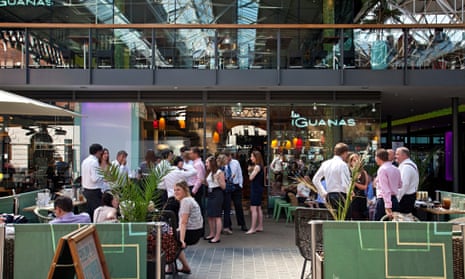The restaurant chain Las Iguanas is coming under increasing pressure from staff and diners to change a controversial tipping policy as thousands of consumers brand the practice “grossly unfair and entirely unnecessary”.
Revealed by the Observer last weekend, the policy requires staff to pay back to their employer 3% of the table sales they generate on each shift – a figure that rises to 5.5% in Las Iguanas’ London restaurants. The chain says the levy does not apply to sales where no tip is left, but this is disputed by staff. An online petition begun last week in response to the revelation, calling on the Latin American-themed chain to abandon the practice and let staff keep their tips, had yesterday attracted more than 50,000 signatures on the 38degrees website.
Waiting staff say they have to pay £30 back to the restaurant in cash at the end of the night if they sell £1,000 of food and drinks in an evening. At Las Iguanas’ London restaurants, the payback would total £55. The money is taken from the waiters’ pot of tips and waiters say that it can wipe out their entire income from gratuities on a busy night.
“I started the petition because I know people power can and will change things,” said Sam Hughes, a Las Iguanas diner. “People who work in restaurants like Las Iguanas are being exploited; it’s unfair, immoral and is not transparent.” Hughes intends to present the petition to Las Iguanas’ management.
The company claims the Observer’s story is “misleading” and states that the 3% is only taken from table sales where the diners at that particular table pay a tip. “We have indeed run a policy for 20 years that rewards ALL of our team when guests generously give a tip to our team members. For clarity this is ONLY when a tip is given,” it says.
It also says staff never have to repay money that exceeds the 3% from their wages. However, a number of waiters working at the chain say this is not how it tends to work in practice. And testimonies given to the Observer appear to suggest that the 3% policy is interpreted differently among the chain’s 41 branches. “Each server is given the option to have just one table per shift exempt from the 3% levy,” said one waiter. “We have to subsidise every single other table that doesn’t tip by paying the 3% levy out of whatever other tips we’ve made. Our pay and the 3% levy are kept completely separate.”
He said that around half of the time he pays more to the company through the 3% rule than he takes home in tips. So on a night that he is tipped £50, he may end up paying £30 back to the company.
Another said: “Las Iguanas’ tip policy does not reflect that not all tables tip. For example, if I have a table where the bill is £200 and they do not tip, then it has cost me £6 out of my tip pot to serve that table. This happens all day, every day. I would say that in general good waiters in our branch probably get about 6% of total sales in tips across an entire shift, so once the company take 3% we are only left with 3% ourselves, and then out of our 3% we are expected to tip out the bar tender or dispense 10% of our total tips.”
Las Iguanas does not mention an additional payment that waiting staff need to make to bar staff in its stated tipping policy. However, it seems that this may be determined at branch level rather than being company policy. Amy Grimshaw, who worked at the Sheffield and Leeds branches, said: “When you cashed out at the end of the night with the manager, there was a line in the spreadsheet that calculated how much you owed for 3%. The 3% calculation in the cashing out spreadsheet was the 3% of your total sales from your section. Nothing to do with your tips at all. Some managers wouldn’t take if you’d had a bad night, or just buy pizza and beers for the team with it, so clearly it wasn’t ringfenced.”
The chain says the money is used to provide “an industry-leading incentives and recognition reward scheme” to all its staff. It said in a statement: “If a member of staff does not earn enough gratuities they will not be made to pay us.”
